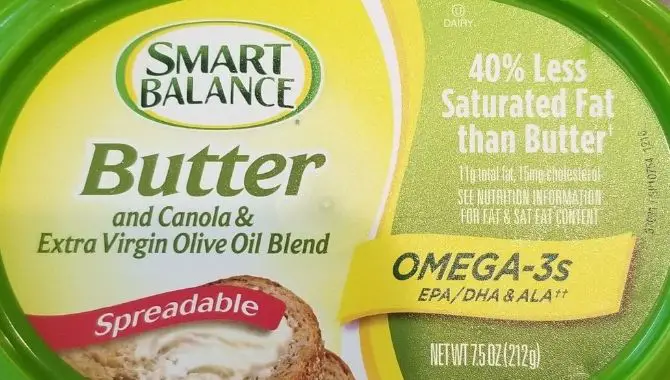Smart Balance is a brand of vegetable oil spread. Smart Balance spreads are touted as offering a buttery taste with the alleged health benefits of vegetable oil. The The manufacturers claim that their products can support healthy cholesterol levels (assuming your cholesterol is already at a healthy level).
The spreads are marketed as being free from trans fats, gluten and diacetyl, and high in ALA. They are also dairy-free, a fact which is bound to attract attention from vegans who want an alternative to butter and spreads containing whey. Unfortunately, most Smart Balance spreads aren’t actually vegan.
Is Smart Balance Vegan?, Smart Balance spreads are not vegan. While they’re certainly dairy-free, they contain a form of vitamin D derived from animal sources. There are Smart Balance spreads that are technically vegan since they’re free of animal products. Unfortunately, the contain palm oil, something strict vegans generally avoid.
Is Smart Balance vegan? What ingredients are in Smart Balance that vegans might be concerned about? Which flavours of Smart Balance spread might be acceptable to vegans? Are there similar spreads that vegans can consume? Are vegetable oil spreads healthy? What can vegans eat instead of vegetable oil spreads?
If you’ve found yourself on this page, you have questions about Smart Balance and other vegetable oil spreads. We’ve got the answers you’re looking for. Read on to find out everything you need to know about vegetable oil spreads and margarine in a vegan diet.
Read Also: Substitute for nutritional yeast
Is Smart Balance Vegan?
Whether or not a product is vegan can depend on a number of factors. Some vegans are happy enough if the products they consume are free from meat, egg, and dairy derivatives. Most vegans, though, are careful to avoid any ingredients that have an animal origin (no matter how far removed).
For vegans who are especially strict, it’s also important to avoid ingredients that, while not derived from animals, might impact on animals in another way. Many vegans are motivated at least in part by environmental consciousness; after all, you can’t reduce animal suffering in the world if you’re contributing to the destruction of animal habitats.
What does this have to do with margarine and vegetable oil spreads? Well, plenty. There are ingredients in Smart Balance spreads that aren’t acceptable for a vegan diet from various perspectives.
First of all, there’s our old enemy: vitamin D3. Smart Balance spreads are fortified with this vitamin. Now, vitamin D is a very important nutrient, and most of us need more of it. Why should vegans avoid vitamin D? Unfortunately, much of the vitamin D used in supplements and fortified foods is actually derived from lanolin: wool fat.
In my opinion, Vitamin D is the most annoying stealth animal ingredient after gelatine. First, you have to give up most of your favourite sweets because of that sneaky gelatine, and then you find that many breakfast cereals, bread products, snacks, supplements and vegetable spreads are off-limits too because someone has decided to add lanolin.
My irritation when I couldn’t find a packet of rice crispies I could eat is memorable. Some vegans argue that since acquiring wool fat doesn’t technically kill the sheep, it should be fine. This is a fairly niche perspective, though, and most of us prefer our food to be a little less… woolly.
The Problem with Palm Oil
To be scrupulously fair to the good folks at Smart Balance, they do make two flavours of their spreads that are free from surprise lanolin. These are Smart Balance Organic and Smart Balance Light with Flaxseed Oil. Neither of these has the dreaded animal-derived vitamin D, so they are, from a certain technical perspective, vegan. However, neither is going on my toast any time soon. Why? Because they both contain palm oil.
Palm oil is another ubiquitous ingredient than most vegans wish would disappear. True, it’s vegetable oil and some analyses stop right there. If you’re a vegan motivated by environmental concerns, though, palm oil is a definite no-no. I personally avoid it like the plague, even though it meant giving up my favourite chocolate-hazelnut spread (luckily I found palm-oil free alternatives because that one was tough!)
Superficially, palm oil certainly looks like it ought to be vegan. It’s extracted from the palm fruit and doesn’t contain any animal products. Unfortunately, much commercial palm oil production is done in ways that are horribly unsustainable and violent. There are many, many human rights violations perpetrated by palm oil producers.
These include tricking people into debt-bondage situations so they can’t leave the plantation, demanding gruellingly long hours of work, and forcing people to work in unsafe conditions. Child labour is painfully prevalent, with workers coerced into making their children work alongside them to meet quotas.
Palm oil production also kills animals. Forests are burned, killing the animals that live there. Orang-utans and other endangered animals are beaten and massacred by palm oil producers, who sometimes drive the terrified animals back into the burning forest. Doesn’t sound very vegan, does it?
In theory, palm oil could be produced sustainably and without harming animals. The reality on the ground is that it’s not. Attempts to set up meaningful regulation have so far failed. Until palm oil can be produced in a way that doesn’t harm animals or people, it’s not really vegan.
Are There Buttery Vegan Spreads?
To be truly vegan, a food needs to be free of animal ingredients and free of ingredients that cause harm to animals. If Smart Balance is off the menu, what can you put on your sandwiches?
Well, the good news is that you’ve got plenty of other options. You could try to identify vegan margarines and spreads by minutely perusing the ingredients list to ensure that every tub is free from things like whey or lanolin-sourced vitamin D (and the dreaded palm oil). A much easier option is to look for spreads that state they’re vegan on the label. Even then, of course, you need to check for ingredients that aren’t fully cruelty free (like palm oil).
Many of your favourite vegan food brands will include a tasty vegan spread in their product ranges. These tend to be my go-to: if they’re made by a company that specialises in vegan food, they’re less likely to include things I don’t want in my food (palm oil). They also tend to use healthier ingredients than conventional spreads and are more likely to be organic.
On the “not fantastic but still good” tier, we find vegan versions of conventional products. Availability varies by region, but more and more big names are bringing out vegan versions of their products. The last time I checked, there was even a vegan “I Can’t Believe It’s Not Butter!”, although it’s hard to get.
If you’re not in a location that’s well-served for vegan groceries, you don’t have to resign yourself to eating dry toast just yet. You can actually make your own spreads at home using coconut oil as a base. Mix one part sunflower oil (or another healthy plant oil) with two parts melted coconut oil, a pinch of salt, and a dash of carrot juice for colour. For a stronger yellow, add a tiny bit of mustard powder. Beat the ingredients together, transfer into a tub, and chill.
Perhaps that sounds like too much hassle, though, and you’d like something a bit more simple. Nut butters are a great substitute — they’re more satisfying, tastier and loaded with healthy fats and other nutrients.
I personally replace most of my spreads these days with oil in a spray bottle. A little spritz of your favourite oil is just as handy as a tub of margarine and much tastier. If I’m feeling extra indulgent, I pour a little oil into a saucer and sprinkle it with nutritional yeast, then dip fresh crusty bread in the resulting mixture. Much yummier than hydrogenated canola oil.
Welcome to VeganClue - My name is Robert Van De Ville and together with my team we spent hundreds of hours researching the most relevant topics for Vegans and non yet Vegans. Are you looking for more information about Veganism, animal welfare, diet, health, and environmental benefits of the Vegan lifestyle? You are in the right place! Enjoy the site.

